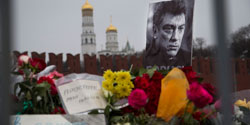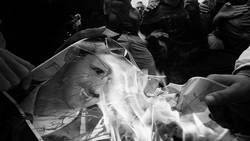In the wake of Boris Nemtsov’s assassination on Feb. 27, Russian authorities have charged two Chechen individuals with his murder, according to the New York Times. A number of others were suspected of the killing, one of whom notably blew himself up.
Assassinations and untimely deaths of political opponents were events that commonly took place in the Cold War age Soviet Union. In most cases, those who opposed the Soviet Premier and their government were taken care off through a myriad of means—often at the hands of the secret police, the KGB. Stalin’s Great Purge was a perfect example of how a former dictator of the then dubbed “evil empire” could easily do away with all of their political enemies.
Russia has been under strict scrutiny lately, mainly because of the annexation of the Crimea and the continued conflict in Ukraine. The circumstances of Nemtsov’s death are causing even more tension in the region, and have lead to a lot of unanswered questions for both Russia and the West.
Nemtsov was a political opponent of current Russian President Vladimir Putin, and was very outspoken against him. In the recent past, Nemtsov has been fighting against the current economic crisis in Russia, and speaking out against what is going on in Ukraine. Nemtsov was not new to the political scene—he served as Deputy Prime Minister under Boris Yeltsin following the collapse of the Soviet Union. Despite numerous arrests for his candidness, Nemtsov continued to speak out again Putin.
Nemtsov was regarded as one of the most vocal, prominent politicians in Russia to speak out against Putin and his regime—he did not hold anything back. He was very direct in how he talked about oppose Putin. Many in Russia have regarded this as to why he may have become a target for pro-Putin radicals.
Prior to his death, Nemtsov was in Moscow organizing rallies against what is going on in Ukraine. It was no secret that even he knew that there would be possible threats on his life, which was not new for a member of the political opposition in Russia. Nemtsov was shot in the back four times around 100 meters from the Kremlin itself, raising many questions.
A majority of the supporters and constituents of Nemtsov are holding the Kremlin and its authorities responsible for this event, although there is continued denial from Putin so it remains unseen what party is to blame. However even if it wasn’t Putin’s authorities directly involved, there is speculation that a rogue party holding allegiance to the Kremlin may be involved.
Dr. Thomas Pearson, professor of the history and anthropology and Russian specialist, added that although he does not feel Putin himself was responsible, this event does not harm Putin—although it does bring embarrassment to Russia. He noted that this assassination could stir up fears amongst Russian people.
Pearson said, “If Nemtsov can be killed, who can be safe?” As Pearson noted, Nemtsov was a prominent political figure and felt that because of that, he held some sort of “shield” to an extent—one that did not protect him from this event.
Numerous news sources account that Western leaders are pushing for the Kremlin to allow independent investigation, but the Kremlin is insisting on handling the investigation itself, giving rise to more speculation. Putin issued statements saying that these events are a disgrace to Russia and that him and his authorities shall be handling the investigation.
Dr. Christopher DeRosa, an associate professor of history and anthropology, said, “I don’t think this latest murder of one of Putin’s opponents, as chilling as it is, will result in greater pressure on Russia from the west; none of the previous ones have, and these murders have been going on for about a decade.”
DeRosa stated that what is going on in Ukraine will most likely continue to lead to the most pressure from the West. He said that despite the United States no longer being able to regulate the global economy and Russia not reaching far into central Europe, we must be wary of re-playing the scenarios of the Cold War.
Nemtsov’s death—coupled with what is happening in Ukraine—is leading Russia further down a path of Western distrust. Although that path may be similar to how relations were during the Cold War, it remains unseen as to how tense they will become.
Marc Sweet, a sophomore history and education major, added, “A message that I think Putin makes clear in his policies and rhetoric, both domestic and foreign, is the idea of “us” against “them.” This idea is something of prominence in Russia; Putin and his government are subtlety pushing anti-Western propaganda to the people of Russia.
Regardless of who is responsible for this event, as it stands, Russia is in a place very familiar to the beginning of the Cold War. Many Russians feel that they are living simply for the present and that there is no future, the xenophobic feelings towards western outsiders has been something carried on in Russia for centuries, even before the days of Lenin, Trotsky, and Stalin.
With Nemtsov’s death, the pro-democracy movement in Russia will slow down considerably and it will be interesting to see who rises as one of the new opposition leaders against Putin after seeing what may happen to one who speaks out.
PHOTO TAKEN from huffingtonpost.com



